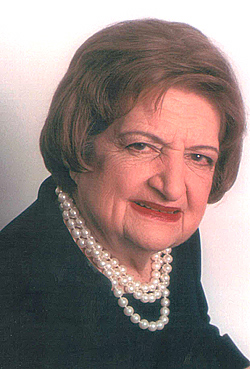Interviewing Helen Thomas is sort of like preparing dinner for a world-renowned chef. It’s a tad intimidating. It’s hard to get around the knowledge that I’m asking questions of someone internationally famous for, well, asking questions. Good ones. Of powerful people.
Fortunately, Thomas is at no loss for opinions. She is now a columnist for Hearst Newspapers after a stunning 57 years working for United Press International, 40 of them as the wire service’s White House correspondent. She’s grilled presidents from Kennedy to Dubya and has set a host of firsts: the first woman officer of the National Press Club after it agreed to admit women as members; the first woman president of the White House Correspondents Association; the first woman member of the Gridiron Club, and later its first woman president; and the first woman reporter, in 1961, to ceremonially close a presidential news conference with the signature, “Thank you, Mr. President.”
These days, as the reigning octogenarian queen of the D.C. press corps, she’s free to speak her mind—about White House journalists and the administration they cover. Her take is scathing.
“We’ve always been manipulated and managed, back to when I began with Kennedy and certainly before, but never to this extent,” Thomas says by phone. “The secrecy in this administration has reached the highest levels. That’s never been seen before. Everybody has to be on board with this president. Nobody plays devil’s advocate . . . There is no search for answers in this president.”
The result of all that secrecy, says Thomas, isn’t just a lack of information for journalists, it’s lack of accountability to the public.
“We are truly, truly being denied the information we should have. 9/11 gave it greater impetus. 9/11 instilled in everyone that we have to be patriotic.
“You get out of that by demanding answers. What is terrorism? What is terror? Why did the president try to kill two investigations of 9/11? . . . If you can’t get to the root of a problem, how can you solve it? There aren’t enough guns in the world to kill hatred.
“How can you want to be a war president? No past president, not even Eisenhower, wanted to be known as a war president.”
Bush has held fewer news conferences than any modern-day president, but, Thomas says, even his administration’s twice-daily White House press briefings have become politicized. “He won’t call on me, and I’m in the back row now so I’m ignored . . . They don’t like my questions. That’s okay, just so somebody asks them, but they just don’t want me to ask questions . . . If I was a favored columnist, I’m sure I’d be in the front row again. But I have the prerogative of asking the questions, I do try. I do think all of us [in the press] have laid down on the job early on [after 9/11]. Some of us are coming out of a coma. But nobody’s being challenging enough. We are adversarial. We aren’t there to worship at anybody’s shrine. We’re there for accountability.”
Thomas also bemoans the trends in journalism that abet nonaccountability: the emphasis on entertainment and noise, the talk shows where hosts and guests dish out opinions without ever giving audiences the unvarnished facts.
“People think talk show [hosts] are journalists, but they’re not,” Thomas scoffs. “They’re getting just plain opinion. I think people are much better served when we get a straight news story, even though I’m a columnist now. My opinion isn’t worth anything.
“I wrote for 57 years for UPI. I was never accused of slant. I wrote dull copy.”
In many ways, Helen Thomas represents a vanishing breed, the mythic Murrow era of journalism, when working-class reporters placed their responsibility for getting the full story to the public above all. These days, national TV news anchors perform (and are paid) like rock stars, and politicians lie and pander shamelessly to feed the media beast’s appetite for sensation—and Thomas has become a celebrity herself.
She’s become one, ironically, because she’s a visible symbol of what’s been lost in celebrity journalism: a desire for the information necessary for citizens to make informed choices in a democracy.
What, after all these years, keeps her going? “Outrage,” she says without hesitation. “And interest in the world, and knowing that I’m lucky to be alive.
“Maybe we can leave a legacy of truth.” She pauses. “Maybe.”
Helen Thomas appears Friday at 7 p.m. at the Museum of History and Industry, 2700 24th Ave. E. Advance tickets are $25 for MOHAI members, $35 for the general public. The day of the event, tickets are $30 for members and $40 for the general public. Call 206-324-1126 for more information.







